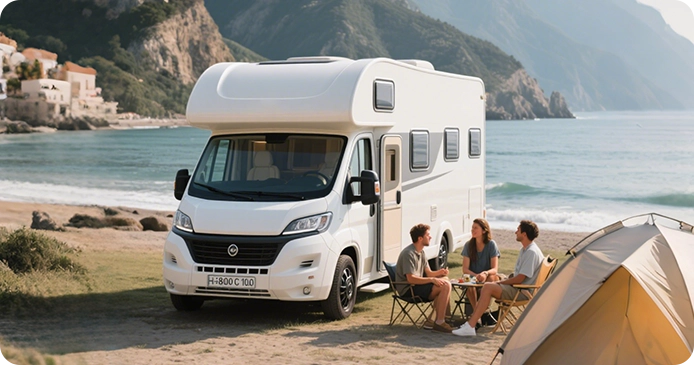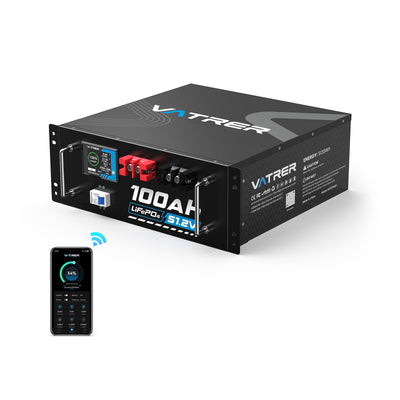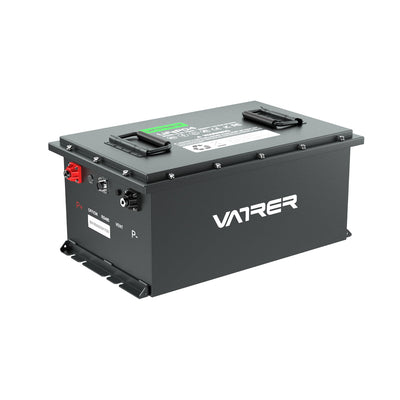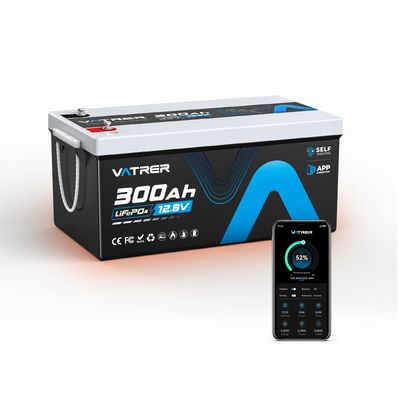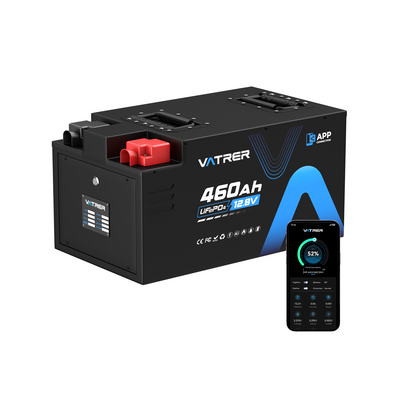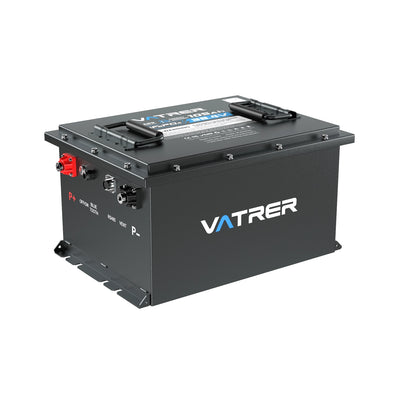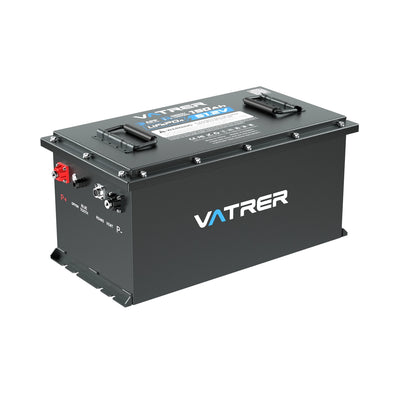
What You Should Know About Golf Cart Lithium Battery
Lithium-ion batteries are the power source for low-speed electric vehicles, such as golf carts and electric sightseeing vehicles. These vehicles rely on deep-cycle lithium-ion batteries to provide hours of stable power in demanding conditions, such as hilly terrain and frequent stops. The selection and management of the battery system directly impacts vehicle performance, service life, and operating costs.
This guide will explore common golf cart battery types, key parameters, selection methods, and maintenance strategies. Understanding this knowledge can help you improve your cart's performance and efficiency, and select the optimal lithium-ion battery.
What is a Deep Cycle Lithium Golf Cart Battery?
Golf carts are a primary mode of transportation in golf courses and tourist attractions, so the choice of power system is crucial. Deep-cycle batteries are designed to provide a continuous, stable current output. They can provide 4-6 hours of reliable power, enabling a daily range of 15-20 miles on an 18-hole course. They can also withstand deep discharges (up to 80% or higher), rather than the short, high-current pulses required by starting batteries.
Deep-cycle golf cart batteries can sustain a current of approximately 100A, with peak current demands reaching 200-300A during acceleration or when climbing steep grades. Unlike traditional lead-acid batteries, which lose capacity under high loads due to the Peukert effect, lithium batteries maintain a stable output. This characteristic enables lithium golf cart batteries to maintain a stable power supply for hours of driving, meeting the demands of navigating the rolling terrain of the course and carrying passengers.

What Are The Differences Between Lead-Acid And Lithium Golf Cart Batteries?
Choosing the right golf cart battery requires understanding the differences between lead-acid batteries and lithium batteries.
Lead-acid batteries use lead and its oxides as electrode materials and sulfuric acid solution as the electrolyte, achieving charge and discharge through an electrochemical reaction. This type of battery technology is mature, with low initial purchase costs. Common voltages are 6V and 8V. Each unit typically weighs approximately 30 kg and offers 500-1,000 cycles and a service life of 2-3 years.
In comparison, lithium batteries offer advantages over traditional lead-acid batteries primarily due to their high energy density. With the same capacity, they weigh only one-third as much as lead-acid batteries, significantly reducing the weight of golf carts. Furthermore, lithium batteries offer a cycle life of up to 3,000-5,000 cycles and require no maintenance such as regular watering or equalizing charges.
The following table summarizes the key differences between the two to help you better understand and choose between them:
| Feature | Lead-Acid Battery | Lithium Battery (LiFePO4) |
|---|---|---|
| Energy Density (Wh/kg) | 30-50Wh/kg | 100-150Wh/kg |
| Cycle Life (Cycles) | 500-1,000 | 3,000-5,000 |
| Weight | Heavy (~61lbs (30kg)/unit) | Light (~60% less) |
| Maintenance | High (add water, clean terminals) | Low (maintenance-free) |
| Self-Discharge Rate (%/month) | 10-15% | 1-3% |
| Initial Cost | Lower | Higher |
| Temperature Range | Limited (poor at <50° F/10° C) | -4° F to 140° F (-20° C to 60° C) |
Although lead-acid batteries are still used by most golf cart owners, this is primarily due to their low initial cost and common usage habits. However, as lithium-ion golf cart battery costs continue to decline and their performance advantages become more apparent, they are becoming the battery of choice for a growing number of high-end golf carts and commercial vehicles, such as EZGO, Yamaha, and club cars, particularly in applications requiring long range, high loads, or extreme temperatures.
Understanding the fundamental differences in the characteristics of these two types of batteries can help you make informed decisions and implement appropriate measures for future battery optimization and maintenance.
What Are The Advantages Of Golf Cart Lithium Batteries?
As lithium-ion battery technology matures and costs decrease, its application in golf carts is gradually penetrating the mainstream market.
Compared to traditional lead-acid batteries, lithium-ion batteries offer significant advantages in energy density and cycle life, precisely meeting the increasing demands of modern golf course operations for efficiency, reliability, and sustainability.
A thorough understanding of these advantages can help you make informed decisions about your powertrain selection and maximize the performance potential of your electric golf cart.
- Longer Driving Range and Energy Density: Lithium battery packs have an energy density of 100-150 Wh/kg, compared to 30-50 Wh/kg for lead-acid batteries. This means they can store two to five times more energy for the same weight. Furthermore, lithium-ion batteries are lighter than lead-acid batteries and offer a range of 30-50 miles per charge, an increase of approximately 15-25% depending on terrain, load, and driving habits. This also reduces tire damage to turf, making them particularly suitable for wet golf courses after rain.
- Fast Charging: Lithium-ion batteries typically support fast charging at 0.5C-1C (some high-end models can reach 2C). This means a 48V100Ah battery pack can be fully charged in 1-2 hours, while traditional lead-acid batteries typically take 8-10 hours to fully charge. The fast charging feature of lithium-ion batteries allows you to quickly top up your battery during lunch breaks, eliminating the need for long overnight charging and reducing the need for backup battery packs.
- Long-term Cost Savings: Although the initial purchase cost of a lithium golf cart battery is 2-3 times that of a lead-acid battery. for example, a golf cart lithium battery kit typically costs $1,000-3,000, it offers a cycle life of 3,000-5,000 charge-discharge cycles, giving it a service life of 5-10 years.
- Environmental Adaptability and Stability: Lithium-ion batteries operate in temperatures ranging from -4°F to 140°F (-20°C to 60°C). At 41°F (5°C), they retain 85% of their capacity, compared to only 60-70% for lead-acid batteries. This solves the issues of lead-acid batteries prone to water loss and plate corrosion in hot climates. Therefore, lithium-ion batteries maintain reliable performance in a variety of climates. Furthermore, lithium-ion batteries have an extremely low self-discharge rate, meaning they retain their charge well even when left idle for extended periods.
- Modular Design and Intelligent Management: lithium-ion battery system utilizes standardized modules, such as 36V, 48V, and 72V to accommodate the voltage and capacity requirements of various golf cart models. The built-in BMS monitors the battery's state of charge (SOC), state of health (SOH, capacity retention), temperature, and fault codes in real time via CAN bus communication, preventing overcharging, over-discharging, and overheating.This data is extremely valuable for team management, helping teams predict remaining range, optimize match schedules, provide early warning of potential failures, perform preventative maintenance, optimize charging strategies, and extend battery life.
- Environmental Compliance: Golf cart lithium batteries do not contain toxic heavy metals such as lead and cadmium, and pose a lower environmental risk during production and use than lead-acid batteries. Lithium battery transportation and disposal regulations are relatively relaxed, reducing overall life cycle management costs.
How To Choose The Right Golf Cart Lithium Battery?
Choosing a golf cart battery isn't simply a matter of matching the model to the cart system; it requires a comprehensive consideration of multiple dimensions based on your actual usage. Unlike home electric vehicles, golf carts typically operate within a fixed field, with fixed routes, stable speeds, but frequent starts and stops, and large load fluctuations. This places specific technical demands on lithium batteries.
Key considerations when choosing a golf cart battery include:
- Voltage and Capacity: Voltage and capacity are two fundamental battery parameters and the primary considerations for matching a golf cart's power system. Most golf carts use 36V or 48V golf cart battery systems, which can be directly replaced without complex modifications. A 48V (51.2V) lithium battery pack with 150Ahcan support 30-60 miles of daily driving on an 18-hole course. A 51.2V battery system uses 16 3.2V lithium iron phosphate cells connected in series and is particularly suitable for applications requiring higher power, such as carrying passengers uphill or on courses with long, hilly terrain. Therefore, the battery capacity you choose should be determined by your daily mileage and load profile.
- Long-term Cost Savings: Lithium batteries can cycle 3,000-4,000 times at an 80% depth of discharge, while lead-acid batteries can only cycle 500-800 times at a 50% depth of discharge, thereby reducing long-term costs. It is worth noting that the cycle life of lead-acid batteries will be drastically shortened if they are frequently discharged beyond 80%, while lithium iron phosphate batteries can maintain stability under deep discharge conditions.
- High-Rate Performance: Golf cart battery performance parameters are often overlooked by golf cart owners. Unlike typical electric vehicles, golf carts require frequent starting and climbing, resulting in extremely high instantaneous current requirements, requiring a peak discharge of 200-300A to achieve acceleration and climbing. For example, the Vatrer 48V 100Ah battery boasts a continuous operating current of up to 200A (2C) and a peak current of up to 400A (35s). Furthermore, high-rate charging capability reduces charging time and maximizes vehicle utilization. The Vatrer 48V 100Ah battery kit comes with a 58.4V 20A smart charger, enabling a rapid 100% charge in just 5 hours.
- Temperature Adaptability: Compared to traditional lead-acid batteries, lithium batteries have a wider operating temperature range. High-quality lithium iron phosphate batteries can operate in environments ranging from -4°F to 140°F (-20°C to 60°C), maintaining optimal performance even in large outdoor temperature fluctuations. Although lithium batteries can discharge at low temperatures, charging efficiency is reduced, and fast charging at low temperatures can cause lithium dendrites. Therefore, we chose Vatrer's 48V 105Ah self-heating lithium batterye quipped with a temperature sensor and heating film. The self-heating function is activated when the battery temperature drops below 32°F (0°C). When the temperature reaches 41°F (5°C), the heating function is turned off and charging resumes.
- Weight and Space: Taking the Vatrer 48V 100Ah as an example, a set of lead-acid batteries of the same model may weigh over 600 lbs, while a lithium-ion battery pack with the same energy capacity can typically reduce weight by over 60%. This not only reduces the cart's weight and improves energy efficiency, but also reduces damage to the turf caused by the vehicle's compaction. In terms of space utilization, the modular design of lithium-ion batteries is more flexible and can better adapt to the battery compartment layout of different vehicle models. For applications requiring additional battery life, lithium-ion battery systems are also easier to expand in capacity by simply adding parallel modules, while lead-acid battery expansion is often limited by space and load capacity.
You can also refer to the following table for golf cart battery selection recommendations for different scenarios:
| Usage Scenario | Key Considerations | Recommended Battery |
|---|---|---|
| Small private course, low usage | Cost, ease of maintenance | Vatrer 100Ah LiFePO4 |
| 18-hole commercial course | Cycle life, fast charging | Vatrer 105Ah LiFePO4 |
| Large resort, long-range | Range, energy density | Vatrer 150Ah LiFePO4 |
| Hilly terrain | Peak current, thermal management | Vatrer 105Ah LiFePO4 |
| Extreme temperatures | Temperature adaptability, BMS | Vatrer 100Ah LiFePO4 heated |
How Do i Know If i Need To Replace My Golf Cart Battery?
- Indicators of lead-acid battery failure include: capacity below 60% of rated value, voltage difference highter than 0.5V/cell at the end of charge, turbid electrolyte (plate active material detachment), or rapid battery drain despite repeated water replenishment. A common phenomenon is a battery showing full charge after just one hour (actually a false voltage), followed by rapid power loss during use. Continued use in this condition may lead to overdischarge and damage to the motor controller.
- Main indicators for lithium battery replacement include: the BMS indicating a SOH below 70%, actual battery life less than 50% of the rated value, cell voltage difference exceeding 100mV after balancing, or battery expansion and deformation. Replace the battery promptly. It's worth noting that lithium battery packs often require replacing only the faulty module, rather than the entire system, saving 40-60% in costs.
How to Converting Your Golf Cart to Lithium Batteries
Switching to a golf cart lithium battery kit offers significant benefits but requires careful planning:
- Voltage and Capacity Matching: Make sure you get a 48V lithium-ion golf cart battery that's compatible with your golf cart system, such as an EZGO lithium-ion battery or a Yamaha golf cart lithium-ion battery conversion kit. 48V systems typically use four 12V lithium-ion batteries connected in series.
- BMS Integration: A BMS is essential for monitoring and protecting lithium battery packs, ensuring compatibility with your cart's controller.
- Physical Fit: Verify that the lithium battery fits the battery compartment, adjusting for size or terminal differences.
- Charger Compatibility: Use a LiFePO4-specific golf cart batteries and charger set. The golf cart battery cost for conversion ranges from $1,000-$3,000, plus ~$299 for a charger.
Consult a professional for proper installation, especially for models like Club Car golf cart lithium battery conversion kit, to ensure safety and performance.
Coclusion: Why Choose Vatrer Battery for Your Golf Cart?
Upgrading to lithium golf cart batteries is a smart investment for performance and long-term savings. Vatrer Battery provides premium lithium 48V golf cart battery packs, including tailored EZGO lithium battery and Club Car golf cart lithium battery conversion kits, featuring modular designs and robust BMS for reliable performance. Backed by a 5-year warranty and widely praised by fleet managers and owners, Vatrer offers a wide range of golf cart battery options. Visit the Vatrer golf cart battery range to explore the golf cart battery package that suits your needs.
FAQs
A question about speed and lithium batteries, a topic that often piques curiosity. While a lithium battery alone cannot directly increase the maximum speed of a golf cart, it can contribute to a perceived increase in speed and overall performance.
You see, lithium batteries offer certain advantages that can enhance the acceleration and power delivery of a golf cart. Their higher voltage and energy density allow for more efficient power output, resulting in improved acceleration and responsiveness. This can give the impression of a faster golf cart.
Furthermore, lithium batteries tend to be lighter than traditional lead-acid batteries. This reduction in weight can positively impact the overall weight distribution of the golf cart, potentially leading to improved handling and maneuverability on the course.
However, it is important to note that golf carts are typically designed with speed limitations for safety reasons. The speed of a golf cart is typically regulated by the controller or other governing mechanisms, and exceeding these limits can be unsafe and potentially illegal.
To summarize, while a lithium battery alone cannot directly increase the maximum speed of a golf cart, it can contribute to improved acceleration and power delivery, which can give the perception of a faster golf cart. Always remember to prioritize safety and adhere to the designated speed limits while enjoying your golf cart adventures.
When it comes to lithium batteries, there is no need to fret about leaving them plugged in all the time. You see, modern lithium batteries used in golf carts are equipped with advanced battery management systems that ensure safe and efficient charging.
These battery management systems are designed to monitor the battery's charge level and automatically cut off the flow of electricity once the battery reaches its optimal charge. This prevents overcharging and protects the battery from potential damage.
So, feel free to leave your lithium golf cart battery plugged in when not in use. It will simply remain in a maintenance or "float" charge state, ensuring that it is ready for your next golfing adventure. However, I must remind you to use a charger specifically designed for lithium batteries and follow the manufacturer's recommendations for charging practices.
Remember, while leaving your lithium battery plugged in is generally safe, it is always a good practice to periodically inspect the battery and charger for any signs of damage or malfunction. This will help ensure the longevity and optimal performance of your lithium golf cart battery.
For more information, see the article: Should You Leave an Electric Golf Cart Plugged In When Not in Use?
Modern lithium golf cart batteries typically incorporate a battery management system (BMS) that monitors the battery's voltage and temperature during the charging process. When the battery reaches its optimal charge level, the BMS automatically cuts off the flow of electricity, preventing overcharging.
This means that, under normal circumstances, you should not be able to overcharge a lithium golf cart battery. The built-in safeguards within the battery and charger work together to ensure safe and efficient charging.
However, it is crucial to use a charger specifically designed for lithium batteries and follow the manufacturer's recommendations for charging practices. Using an incompatible charger or deviating from the recommended charging parameters can potentially override the built-in safeguards and lead to overcharging or other safety hazards.
The number of lithium batteries required for a 48-volt golf cart depends on the voltage rating of each individual lithium battery.
To achieve a 48-volt system, you would typically need four 12-volt lithium batteries wired in series. When batteries are connected in series, their voltages are summed up. So, four 12-volt batteries, each with a nominal voltage of 3.2 volts, would add up to a total of 12.8 volts per battery, resulting in a 48-volt system when connected in series.
It's important to note that the specific voltage rating of lithium batteries can vary, so it's essential to check the specifications of the batteries you intend to use to ensure they are compatible with your golf cart's electrical system requirements.
Additionally, it's important to consider other factors such as battery capacity (Ah), physical size, weight, and compatibility with your golf cart's existing electrical components when selecting the appropriate lithium batteries for your 48-volt golf cart.
If you have any doubts or need assistance in determining the right battery configuration for your specific golf cart, I recommend consulting with a knowledgeable expert or referring to your golf cart's manufacturer guidelines for battery selection and installation.
1 comment
I purchased 4 – 12 volt lithium phosfate batteries (Vatrer) but my distance range is only 3/4 of 1 mile. Then I run out of power.
I charge with your charger, 48 volts, overnight.
I’m using it on my farm to save my legs as I’m 73.
Continues driving, 1/4 to 1/2 miles at a time drains the batteries and it quits. Short 100 yard trips, lasts all day.
When I take a passenger the cart runs out of power in 1/2 mile.
I have it wired in a series and have a new solinoid. The cart wants move but won’t because low power.
It’s a 2005 Club Car. No lights or accessories to be a drain.
Good acceleration and goes faster than I want to go. Faster than the lead batteries, easily.
One wire does get hot. The rest are cool to the touch.
Maybe to small of a wire, heating up causing the batteries to shut down? My property is hilly, power to go up and have to use the brake coasting down.
These are 100ah batteries.
Could one battery be bad?
How to test for that?
In setting them up , I followed your directions, balancing them in parallel, then charged them in a series, then installed them with fresh cables.
What are your thoughts?




























